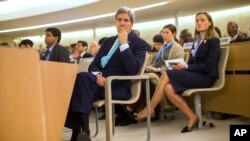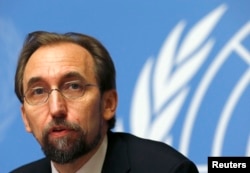Discrimination, racism, islamaphobia and anti-semitism are among the many disquieting issues to be explored at the session of the U.N. human rights council. The four-week meeting is opening with a four day high-level segment, during which senior officials will discuss issues of national interest and global concern.
By video link from New York, U.N. Secretary-General, Ban Ki Moon weighed in on the importance of nations to do their utmost to combat human rights violations, which continue to escalate in many parts of the world.
“The world faces serious violations of human rights from discrimination and inequality to oppression and violent extremism," he stated. "Our shared challenge is to do far more to keep these and other abuses from operating in the first place. The country of Syria, of course, is just one where all United Nations' efforts to address human rights violations might have averted a human and political catastrophe.”
Ban said the United Nations has the mandate and tools to prevent such disasters. Unfortunately, he notes these tools often go unused because countries, for political reasons, cannot agree on what action to take.
In the case of Syria, the United Nations estimates more than 200,000 people have been killed in this conflict, which is entering its fifth year. It said 12.2 million Syrians are in need of aid, including the 7.6 million internally displaced people. Another four million Syrians have sought refuge in neighboring countries.
U.N. High Commissioner for Human Rights Zeid Ra’ad Al Hussein opened the Council with a criticism of countries he said often put their own interests ahead of the human rights of their citizens.
"Despite member states making clear commitments to the principles of the United Nations Charter, human rights were disregarded, and violated, sometimes to a shocking degree," said Hussein.
He said he is especially disturbed by the contempt and disregard displayed by several states towards the women and men appointed by them as independent experts and by the reprisals and smear campaigns frequently targeted against them.
“Some policy-makers persuade themselves that their circumstances are exceptional, creating a wholly new reality unforeseen by the law. This logic is abundant around the world today ... in reality, neither terrorism, nor globalization, nor migration are qualitatively new threats that can justify overturning the legal foundations of life on Earth," said Hussein. "They are not new.”
The high commissioner said it is the duty and responsibility of governments to protect the rights of their people, not deprive them of these rights.
Highlights of the four week Council session include presentations by the independent Commissions of Inquiry on Syria, Eritrea and the 2014 Gaza Conflict.
It will present reports on the human rights situation in Iraq in light of abuses committed by the so-called Islamic State and will discuss the situations in North Korea, Iran, Burma, Central African Republic, Ivory Coast and Mali among others.





